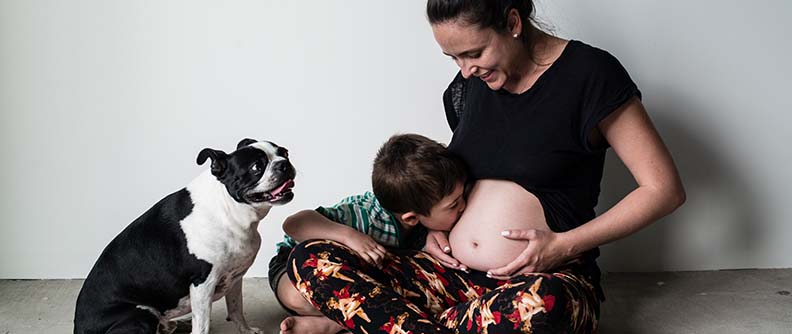Like any other member of the family, pets need time to get used to the idea of having a new baby around the house. No matter how friendly they might normally be, pets can act out and cause harm to you or your baby. This is especially true if your pet is scared, feels threatened, or gets very excited.
Keep your pets healthy
First of all, make sure your pets are as healthy as possible before bringing your baby home. All cats and dogs should be current on their vaccinations. Use flea, tick, and worm controlling products. Make sure they are comfortable with having their nails trimmed. Spaying or neutering your pets can reduce aggressive behavior.
Pet areas should be kept clean, and all pet waste should be cleaned up immediately. If you have cats, be sure to keep litter boxes in a low-traffic area away from family members. Reptiles, rodents, and other pets should never be allowed to roam freely.
Preparing dogs for a baby
Be especially careful when bringing a newborn into a home where a dog has gotten a lot of attention. They can become jealous, aggressive, and defensive about trying to protect their place in the family. To help prevent problems, try these tips:
- Consider enrolling your dog in obedience classes to help with behavioral issues. You can also seek the advice of a professional trainer.
- Make sure your dog has a place of its own, like a crate or a bed, where it can go and not be disturbed.
- Redirect behaviors like nipping, pouncing, or swatting to toys instead of people.
- Closely supervise all interactions between children and dogs.
Before your baby is born
You’ll be experiencing a lot of changes, and so will your pet. Here are some ways to prepare your pet for when your newborn comes home:
- Teach your pets to entertain themselves with toys or chews. This helps prevent sudden changes in attention that may confuse or upset them.
- Train your pets to remain calm and on the floor near you until you invite them onto your lap.
- Play recordings of babies crying and other baby noises to help your pets get used to them.
- Talk about the new baby in front of your pets, using the baby’s name if you’ve already chosen one.
After your baby is born
When you come home, never force your pet to interact with your newborn. Some dogs will sniff at a baby, often at their feet, and then walk away. That’s normal behavior. Here are some other things you can try:
- Before your pet meets your baby, let it sniff a blanket or other item with the baby's scent on it.
- Bring your pet with you to sit next to the baby. Give the animal treats to develop positive associations with the baby.
- If you have time, spend some one-on-one time with your pet each day.
